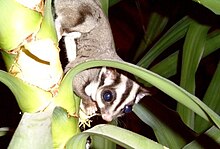| Petauroidea Temporal range: | |
|---|---|
 | |
| Petaurus breviceps | |
| Scientific classification | |
| Domain: | Eukaryota |
| Kingdom: | Animalia |
| Phylum: | Chordata |
| Class: | Mammalia |
| Infraclass: | Marsupialia |
| Order: | Diprotodontia |
| Suborder: | Phalangeriformes |
| Superfamily: | Petauroidea C.L. Bonaparte, 1838 |
| Families | |
Petauroidea is a superfamily of marsupials from Australia and New Guinea. It is part of the suborder Phalangeriformes within the order Diprotodontia, which also includes, among others, wombats, kangaroos, cuscuses. The superfamily Phalangeroidea, including cuscuses and brushtail possums (family Phalangeridae) and pygmy possums (family Burramyidae), is the immediate sister group of the Petauroidea. The earliest fossils from this superfamily are from the Oligocene of the Geilston Bay fossil site in Tasmania. [1]



